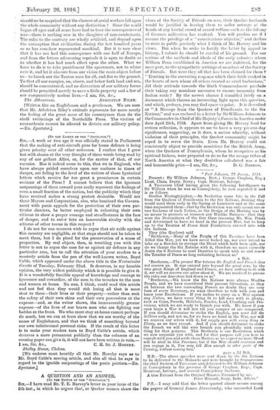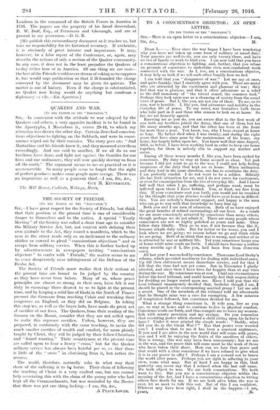A QUESTION AND AN ANSWER.
[TO TIM EDITOR OP Till " SPROTATOILI 13133,—I have read Mr.. T. E. Harvey's letter in:your issue .of the; Nth inst., in which he argues that, as Quaker women share the views of the Society of Friends on war, their Quaker husbands would be justified in leaving them to suffer outrage at the hands of any bestial crowd of armed ruffians such as the infamy of German militarism has evolved. You will pardon me if I assume the privilege of a " conscientious objector," and decline to state in public precisely what I think of Mr. Harvey and his views. But when he seeks to fortify the latter by appeal to history, I submit he should be careful of his ground. For our notions of the methods and ideals of the early colonists whom William Penn established in America we are indebted, for the most part, to the sympathetic writings of members of the Society of Friends. But were they all that has been claimed for them / "Trusting in the answering response which their faith evoked in the hearts of men whom all others treated as cruel barbarians,'.' did their attitude towards the Sixth Commandment preclude their taking any mundane measures to ensure immunity from Indian raids ? By the merest chance I stumbled lately on A document which throws an interesting light upon this question, and which, perhaps, you may find space to print. It is described as " A Message from the Quakers of Pensilvania to the Six Nations," and was enclosed in a letter by Sir William Johnson to the Commander-in-Chief of His Majesty's Forces in America under date April 28th, 1758. Apart from giving Mr. Harvey food for serious reflection, it appears to me to have a very present-day significance, suggesting, as it does, a means whereby, without violation of their principles, the Quaker community might be roped in to servo the State. Even Mr. Harvey could not consistently object to provide munitions for the British Army, when the Quakers of Pennsylvania, whom he recognizes as his spiritual fathers, were prepared to do so for the savage tribes of North America at what they doubtless calculated was a fair and honourable price.—I am, Sir, &c., D. G. BARRON.
"Fort Johnson, 29 Janry., 1758. Present : Sir William Johnson, Bart. ; George Croghan, Esq.; Lieut. Claus, Depty. Seery ; Capt. Montour, Interpr.
A Tuscavore Chief having given tho following Intelligence to Sir William when ho was aeConnajohery, he now repeated it and is as follows.
Brother Warraglyjaghey,—An Invitation came late in the Fall
from the Quakers of Pensilvania to the Six Nations, desiring they would meet them early in tho Spring at Lancaster and at the same time acquainted them—that by the Invitation was only meant one dr two Sachems of each Nation, as the Design of the Meeting was by no means to promote or transact any Warlike Buisness—that they were the Descendants of the first Ones (meaning Mr. Win. Penn) and determined to have no hand in the present War, but to keep up to the Treaties of Peace their Forefathers entered into with the Indians.
They (the Quakers) said
Bretheren,—Many of the People of this Province have been killed this War, yet we have never looked up, nor ever intend to take up a Hatchet to revenge the Blood which bath been spilt, nor do we charge the Six Nations with it, therefore we must earnestly desire the 6 Nations to send Deputies to speak with us and renew the Treaties of Peace so long subsisting between us.'
a Belt.
'Bretheren,—The present War between the English and French does not concern us. It was entered into beyond the great seas. by the two great Kings of England and France, we have nothing to do with it, nor will we concern our selves about it. We are resolved to pursue the rules our Ancestors laid down to us.'
' Bretheren,—We know the Six Nations were. always Warlike People, and we have considered their present Sittuation, as they sit between the two contending Powers no doubt they are very bare of every Necessary, we want therefore to talk with you and know your Resolutions. If you incline to carry on a War against any Nation, we have every thing fit to kill men with in plenty, such as Guns, Swords, Hatchets, Ponder, Lead, Cloathing and Pro- visions, which we are ready to furnish you with. We know if you once begin a War it will last till you conquer or are conquered. If you should determine to strike the English, you must kill the Soldiers only, and not us, for we have no hand in the War, nor will we concern our selves with it, but supply you with every thing in Plenty, as we have enough. And if you should detirminc to strike the French we will like wise furnish you plentifully with every thing for that purpose. This Bretheren is our Resolution which we now acquaint you with, and for that purpose call you hero to consult with you and settle those Matters as we expect no more Blood will be shed in this Province, but if the War should continue and you engage in it, You may kill Men enough in other parts of the Country, without coming here.'
gave a 2d Belt. N.B.—The above speeches were sent down by the Six Nations to be delivered to the Mohawks and were brought by Sequareesero the chief Sachem of Tuscavore and delivered to Sir William Johnson at Connojohary in the presence Of George Croghan, Esqr., Capt. Moantour, Interpr., and several Connojohary Sachems.
A true Extract from the Original Minutes Examined by me,
Peter Wraxall, Seery. Indn. Affairs."
may add that the letter quoted above occurs among the papers of General James Abercromby, who succeeded Lord
Loudoun in the command of the British Forces in America in 1756. The papers aro the property of his lineal descendant, R. W. Duff, Esq., of Fetteresso and Glassaugh, and are at present in my possession.—D. 0. B.
[We publish this extraordinary document as it reaches us, but take no responsibility for its historical accuracy. If authentic, it is obviously of great interest and importance. It may, however, be a false report of the Conference, or, again, may describe the actions of only a section of the Quaker community. In any case, it does not in the least prejudice the Quakers of to-day either here or in America. Of one thing we are sure— the best of the Friends would never dream of asking us to suppress it, but would urgo publication so that if ill-founded the charge conveyed by the document may be given its quietus. The matter is ono of history. Even if the charge is substantiated, no Quaker now living would do anything but condemn a diplomacy so vilo.—ED. Spectator.]



































 Previous page
Previous page